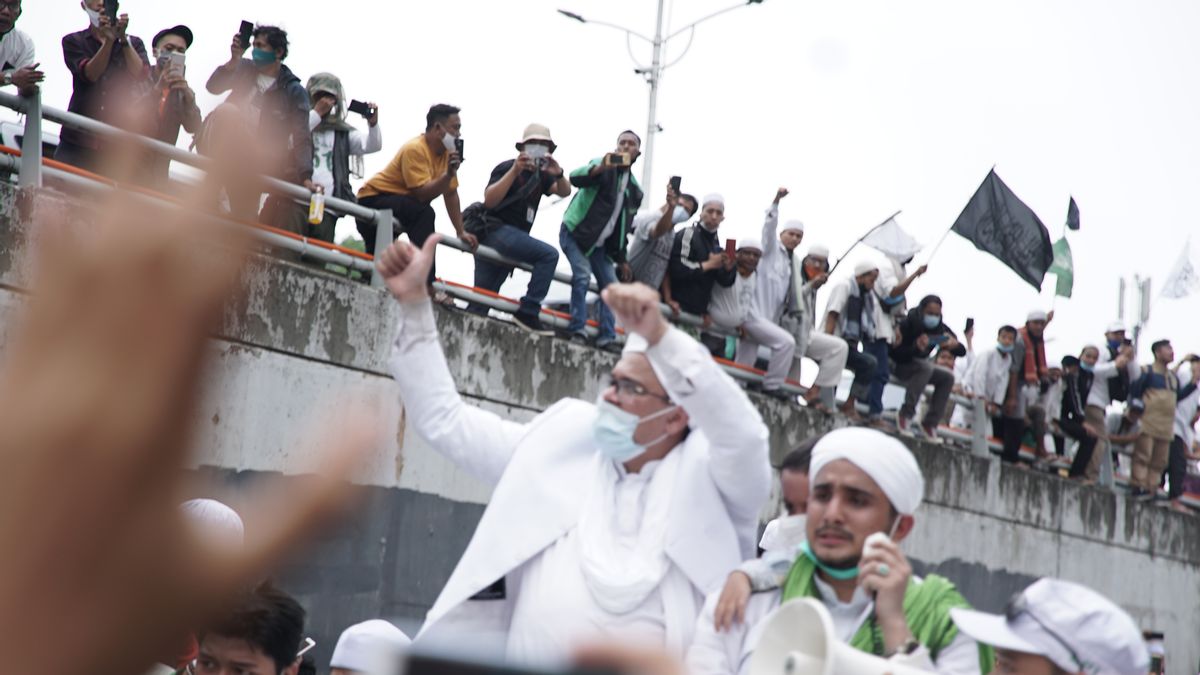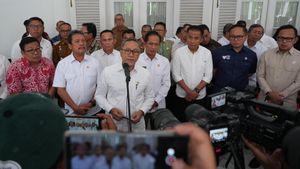JAKARTA - The government has banned all activities of the Islamic Defenders Front (FPI). FPI will no longer have a legal position as a community organization (ormas) or an ordinary organization. FPI symbols will also be banned. However, if you look at history, state legitimacy is not a big problem for FPI. FPI is developing in a more fluid manner based on its unique popularity.
The Coordinating Minister for Political, Legal and Human Rights (Menko Polhukam) Mahfud MD explained, de jure, FPI has disbanded as a mass organization since June 20, 2019. The government views FPI as an organization that is closely related to violations of order, security, and is often involved in legal conflicts. .
"Such as acts of violence, sweeping, provocation and so on," said Mahfud MD, in a press conference, Wednesday, December 30.
Completely, Deputy Minister of Law and Human Rights Eddy Ommar Sharief Hiariej explained that this prohibition has implications for the existence of FPI in a broad sense. Not only activities, FPI symbols will also be banned. Likewise with the existence of its members.
"It is prohibited to carry out activities, the use of FPI symbols and attributes in the jurisdiction of the Unitary State of the Republic of Indonesia," said Eddy at the Office of the Coordinating Ministry for Political, Legal and Security Affairs, Jalan Medan Merdeka Barat, Central Jakarta, Wednesday, December 30.
"If there is a violation as described in the dictum above, law enforcement officials will stop all activities carried out by the Islamic Defenders Front," he added.
Eddy also asked the community not to be involved in activities or the use of FPI symbols and attributes. In addition, the community is also asked to report if they find activities, the use of attributes or symbols of the organization.
FPI is not bound by formal institutionsMany literacies illustrate the uniqueness of FPI. One of them is about the liquid nature of FPI. Al Zastrouw Ng., In the book Symbolic Islamic Movement: Political Interests of FPI (2006) explains this.
Fundamentally, the birth of FPI shows the religious spirit of a group of Muslims. They move in a fanatical missionary movement.
As an organization based on movement, FPI does not place much importance on institutional forms. Unlike other mass organizations. Even from the way of recruiting. FPI is not an organization that carries out permanent and systematic membership recruitment.
“FPI members are not bound by formal and strict organizational rules. The main binding that holds FPI members together is moral commitment and loyalty to the leader. This condition makes it difficult for the author to find the exact number of FPI members, "the book says.
In FPI, the ulama have the central role. Grand Imam Habib Rizieq Shihab, since the establishment of FPI, he has managed to gather 20 well-known scholars to establish FPI. Some of them are KH Fathono, KH Misbahul Anam, KH Cecep Bustomi, and Habib Idrus Jamalullail.
They have all been known to be active mubaliqs since the New Order era. Some of them were jailed for being too critical of the Soeharto government.
In fact, if we take it back to the past, the seeds of FPI's birth existed long before its official formation. Quoted by M. Imdadun Rachmat in the book Arus Islam Radical (2005), the scholars who have the same vision to form FPI with a distinctive style of traditional Islam.
FPI has long broadcast the spirit of upholding amar ma'ruf nahi munkar through a variety of events, such as recitation, tahlil, salawatan, tabligh akbar, hearings with elements of the government, as well as through friendship between famous religious figures. "Meanwhile, FPI, is more of an organization that emerged from the ulama, preacher, and haba'ib who have traditional Islamic characteristics," wrote M. Imdadun Rachmad.
"They practice rituals that are opposed by supporters of the Tarbiyah movement, Hizbut Tahrir Indonesia, the Indonesian Mujahidin Council, and Laskar Jihad, which carry purification and are thought to be close to the Middle East. FPI circles are familiar with tahlil, barzanji, salawat, and puj- praise which is often identified with bid'ah. "
Intelligence and security observer, Stanislaus Riyanta also sees this kind of institutional contours of FPI. He asked the government to be aware of the impact of banning FPI activities.
FPI's mass base is one of the strongest and most militant among many other mass organizations in Indonesia. There are several possibilities that occur after the prohibition of FPI activities.
"The first is the disappointment by the members of the FPI sampatisan towards the government. The large and militant mass base allows for resistance action," he said in a written statement, quoted Wednesday, December 30, 2020.
If not resistance, another possibility that emerged would of course be an underground movement. It is possible for FPI sympathizers to carry out activities with the same ideology under different names. HTI has become a clear example, said Stanislaus.
The English, Chinese, Japanese, Arabic, and French versions are automatically generated by the AI. So there may still be inaccuracies in translating, please always see Indonesian as our main language. (system supported by DigitalSiber.id)













